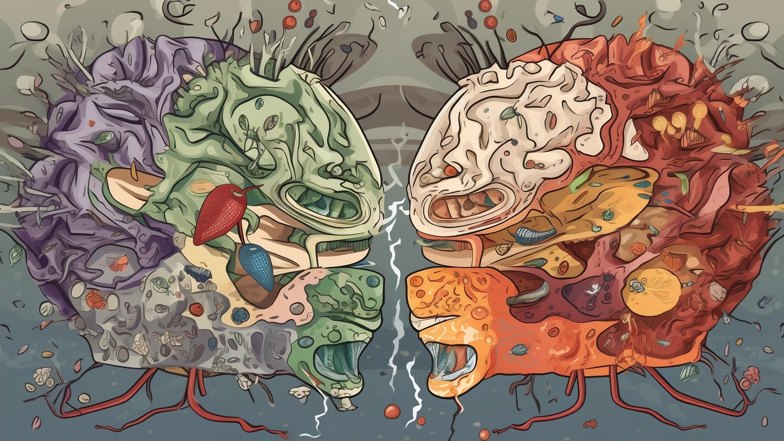
The nervous system is responsible for communication between different parts of the body, including the brain, spinal cord, and peripheral nerves. It controls both voluntary and involuntary actions, allowing us to move, sense, perceive, and think. The immune system, on the other hand, is the body’s main defense against pathogens, parasites, and other foreign invaders. It also plays a role in tissue repair and regeneration, as well as in the prevention of cancer and other diseases.
At first glance, it might seem like the nervous and immune systems operate independently of each other. After all, the former deals with electrical and chemical signals, while the latter relies on cells and molecules that can detect and neutralize threats. However, it turns out that the two systems are closely intertwined and can influence each other in various ways.
For instance, researchers have found that immune cells can produce molecules such as cytokines and chemokines that can affect neurotransmitters in the brain and alter mood, behavior, and cognition. Similarly, nerve cells can release neuropeptides and neuromodulators that can activate or inhibit immune cells, leading to inflammation, immune activation, or suppression. Moreover, immune cells can migrate to the brain and interact with nerve cells, forming a so-called “neuroimmune interface” that can impact brain function and behavior.
One area of research that has garnered considerable attention in recent years is the role of the gut-brain-axis in neuroimmunology. The gut is home to millions of bacteria and other microbes that play a vital role in digestion, metabolism, and immunity. However, these microbes also produce metabolites and other substances that can impact brain function and behavior. Studies have shown that changes in the gut microbiome can affect mood, cognition, and stress responses, and may contribute to the development of conditions such as depression, anxiety, and autism.
Moreover, researchers have found that the gut-brain-axis is bidirectional, meaning that signals from the brain can also influence gut microbiota composition and activity. For example, exposure to stress or trauma can alter the gut microbiome and increase the risk of inflammatory diseases, while dietary changes or probiotics can modulate the gut-brain-axis and improve mental health outcomes.
These findings have led to the development of new therapies that target the gut-brain-axis to treat a range of neurological and immunological disorders. For example, fecal microbiota transplantation (FMT) has been shown to be effective in treating recurrent Clostridium difficile infection, a condition that causes severe diarrhea and inflammation of the colon. FMT involves transferring stool from a healthy donor into the patient’s gut, replenishing the microbiome with beneficial bacteria and restoring balance.
Similarly, probiotics and prebiotics have been used to treat irritable bowel syndrome (IBS) and other digestive disorders, as well as to improve immune function and reduce inflammation. Probiotics are live bacteria that can colonize the gut and promote health, while prebiotics are non-digestible fibers that stimulate the growth of beneficial bacteria. Some studies have also investigated the use of probiotics and prebiotics in treating conditions such as depression, autism, and schizophrenia, although more research is needed to confirm their effectiveness.
In addition to the gut-brain-axis, researchers are also exploring other ways in which neuroimmunology can be harnessed to improve health outcomes. For example, immunotherapy is a promising field that uses the body’s own immune system to fight cancer. Immunotherapy drugs can boost the immune response against cancer cells, enabling the body to recognize and eliminate them. Some immunotherapy drugs have shown remarkable success rates in treating melanoma, lung cancer, and other types of cancer.
Another area of research is the use of neuroimmunology to treat neurodegenerative diseases such as Alzheimer’s and Parkinson’s. These conditions are characterized by the progressive loss of nerve cells and the accumulation of toxic proteins in the brain. Researchers have found that the immune system plays a critical role in the development and progression of these diseases, and have identified several targets for immunotherapy.
For example, monoclonal antibodies that can bind to and neutralize amyloid-beta and tau proteins, which are implicated in Alzheimer’s, have been developed and tested in clinical trials. Similarly, drugs that can modulate microglia, the immune cells in the brain, have been investigated as potential treatments for Parkinson’s. These therapies hold great promise for slowing down or even reversing the damage caused by neurodegenerative diseases, although more research is needed to determine their safety and effectiveness.
In conclusion, the field of neuroimmunology is a rapidly growing area of research that sheds light on the complex and dynamic relationship between the nervous and immune systems. The gut-brain-axis, immunotherapy, and neurodegenerative diseases are just a few of the topics that are being explored in this field, with promising results. By understanding how the nervous and immune systems interact, researchers and clinicians can develop new therapies and treatments that leverage the body’s own defense mechanisms to combat diseases and improve health outcomes.
Comments
Post a Comment